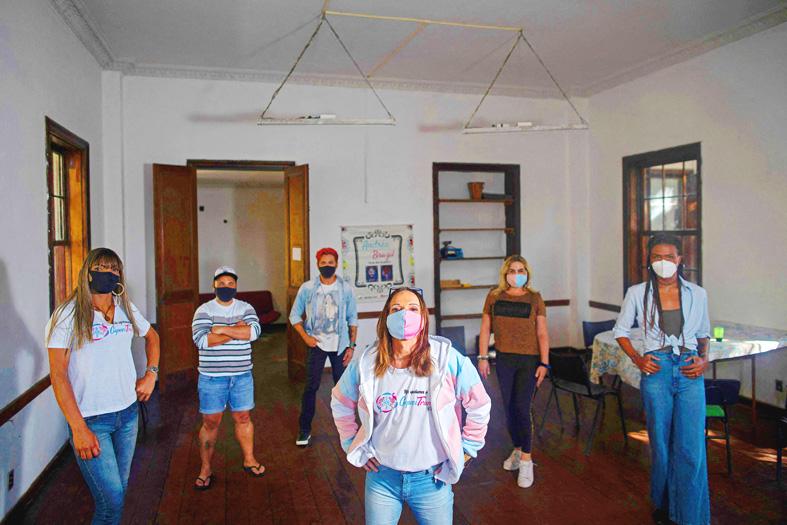For 15 years, Rochelly Rangel, 34, struggled to find a formal job in Brazil. As a transgender woman, she faced repeated rejection, insults, and once overheard a prospective boss saying: “We cannot hire a transvestite.”
She ended up working as a prostitute for six years despite having a high school technical qualification in administrative management, and also dabbled in hairdressing.
Then last year, thanks to one of a growing number of training programs aimed specifically at transgender people in famously macho and homophobic Brazil, she finally found formal employment at a bar in Rio de Janeiro.

Photo: AFP
“It was hard to get here,” she said.
Last year, 175 trans people were murdered in Brazil — one every two days. Brazil has had the world’s highest number of transgender killings since 2008.
About 90 percent of trans people in Brazil end up working as prostitutes, according to the Asociacion Nacional de Travestis y Transexuales, a gay rights association.

Photo: AFP
The life expectancy of transgender people in Brazil is about 35 years, less than half the national average.
Identifying as transgender since her teens, Rangel said that during her long and fruitless search for work, she was taking female hormones and dressing as a woman, but she was unable to legally change her male, birth name.
“I did more than 200 job interviews, but when they [looked at] my ID and resume and saw my name, they looked at me sideways or said that the vacancy was already filled,” she said.
In 2004, fresh from school, she applied for an administration post at a multinational company in Sao Paolo, where she lived at the time, and made it to the short list.
Her only rival, a young man, got the job.
“I overheard a manager tell an HR employee: ‘We cannot hire a transvestite,’” Rangel said.
Moving to Rio after several disappointments, she found the program Transgarconne run by the Federal University of Rio de Janeiro to help place transgender people in jobs at bars and restaurants.
For Rangel, her chance came at the Boleia Bar, where she works with other women.
The Transgarconne platform, started in 2019, also provides training and advice for bosses on dealing with LGBTQ+ issues.
Brazil’s biggest job platform for transgender people was born in Sao Paulo.
TransEmpregos found posts for 707 people last year, said creator Marcia Rocha, who is a lawyer and transvestite.
“We have more than 24,000 CVs and a thousand associated companies,” she said. “There has been an exponential increase in companies that hire trans people; there are more than a hundred multinationals with available posts.”
This is a useful resource in a country of 212 million — 14 million of whom are unemployed — and a service sector hard hit by the COVID-19 pandemic.
Advances for Rangel and others like her have been slow.
“It used to be thought that transsexuals could only work as prostitutes. The biggest challenge was to break this prejudice in the business environment,” Rocha said.
TransEmpregos belongs to the LGBTQ+ Business and Rights forum of Brazil, a grouping of more than 100 companies that have signed a commitment to diversity.
Unlike countries such as Argentina, where there is a legal quota for transgender people in the public sector, Brazil has no protections.
Transgender people have been able to choose their name on their ID documents without a court permission, a letter from a psychologist or proof that they are undergoing hormone treatment only for the past three years.
“We are 1 percent of the Brazilian population ... but we exist, even though they want us to be invisible,” said Andrea Brazil, a stylist and creator of Capacitrans, another trans job agency.

Asian perspectives of the US have shifted from a country once perceived as a force of “moral legitimacy” to something akin to “a landlord seeking rent,” Singaporean Minister for Defence Ng Eng Hen (黃永宏) said on the sidelines of an international security meeting. Ng said in a round-table discussion at the Munich Security Conference in Germany that assumptions undertaken in the years after the end of World War II have fundamentally changed. One example is that from the time of former US president John F. Kennedy’s inaugural address more than 60 years ago, the image of the US was of a country

Cook Islands officials yesterday said they had discussed seabed minerals research with China as the small Pacific island mulls deep-sea mining of its waters. The self-governing country of 17,000 people — a former colony of close partner New Zealand — has licensed three companies to explore the seabed for nodules rich in metals such as nickel and cobalt, which are used in electric vehicle (EV) batteries. Despite issuing the five-year exploration licenses in 2022, the Cook Islands government said it would not decide whether to harvest the potato-sized nodules until it has assessed environmental and other impacts. Cook Islands Prime Minister Mark Brown

BLIND COST CUTTING: A DOGE push to lay off 2,000 energy department workers resulted in hundreds of staff at a nuclear security agency being fired — then ‘unfired’ US President Donald Trump’s administration has halted the firings of hundreds of federal employees who were tasked with working on the nation’s nuclear weapons programs, in an about-face that has left workers confused and experts cautioning that the Department of Government Efficiency’s (DOGE’s) blind cost cutting would put communities at risk. Three US officials who spoke to The Associated Press said up to 350 employees at the National Nuclear Security Administration (NNSA) were abruptly laid off late on Thursday, with some losing access to e-mail before they’d learned they were fired, only to try to enter their offices on Friday morning

STEADFAST DART: The six-week exercise, which involves about 10,000 troops from nine nations, focuses on rapid deployment scenarios and multidomain operations NATO is testing its ability to rapidly deploy across eastern Europe — without direct US assistance — as Washington shifts its approach toward European defense and the war in Ukraine. The six-week Steadfast Dart 2025 exercises across Bulgaria, Romania and Greece are taking place as Russia’s invasion of Ukraine approaches the three-year mark. They involve about 10,000 troops from nine nations and represent the largest NATO operation planned this year. The US absence from the exercises comes as European nations scramble to build greater military self-sufficiency over their concerns about the commitment of US President Donald Trump’s administration to common defense and